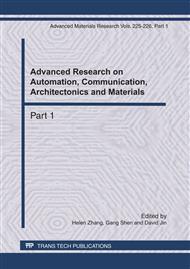p.47
p.51
p.57
p.61
p.65
p.70
p.75
p.80
p.84
Design of the Adaptive Filter Based Mind Evolutionary Computation
Abstract:
This paper describes the basic idea of Mind Evolutionary Computation and its advantages, the basic steps of the algorithm .The optimal adaptive filters are design based on MEC, which don’t need any priori statistical knowledge of signal and noise, and the parameters of adaptive filters can be automatically adjusted to the best in accordance with certain criteria. Simulation results show that the proposed method can quickly design effective optimal adaptive filters.
Info:
Periodical:
Pages:
65-69
Citation:
Online since:
April 2011
Authors:
Keywords:
Price:
Сopyright:
© 2011 Trans Tech Publications Ltd. All Rights Reserved
Share:
Citation:


